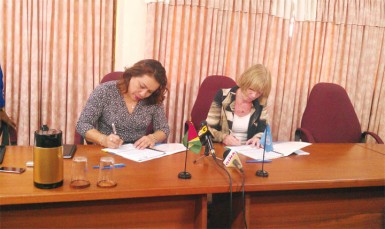The Foreign Affairs Ministry and UNICEF Guyana yesterday signed the Government of Guyana – UNICEF Annual work plan for the year 2014, which targets the development of children’s rights.
The US$1,645,956 contract was signed by Foreign Affairs Minister Carolyn Rodrigues-Birkett and UNICEF’s Resident Representative Marianne Flach, at the Ministry of Foreign Affairs in South Road.
The work plan came from the 2012 – 2016 country programme, which was developed between the government and UNICEF in pursuit of the rights of children and gender equality. The plan outlines specific areas which need urgent intervention to be executed

by the ministries of Human Services and Social Security, Education and Health.
“UNICEF is a very important UN organisation for Guyana, specifically as it focuses on improving the lives of children… and that for us is very important especially in the areas of health, education and their personal welfare,” said Rodrigues-Birkett while stating that the government has seen improvement in certain areas.
“But what we hope to do and what we have been working on is the 2012 – 2016 programme by focusing a lot on evidence-based programmes of action. This is very important for us, especially as we seek to achieve the Millennium Development Goals [MDGs] eliminating poverty and hunger,” she said, before noting that there should be more focus on the hinterland areas because statistics show that the hinterland is one of the most vulnerable areas.
Violence against children is on the rise, Flach stated, while calling on the people to press for the utilisation of the Family Court and the execution of Sexual Offences Act.
“Violence against children is a big problem in your country. If we look at the first two months of this year there has been at least six difficult cases that have been reported on. There should be a comprehensive approach to child protection and not separate individual acts because we may have progress but the progress may be too small. This deserves the attention of the parents, of the community members, of the government, of the NGOs, of the civil society, of the UN as a whole. So I call upon all of you to help us in addressing this important issue,” she said.
“It is important for us that we can start early in the year executing our plan,” she said, referring to the annual plan. She noted that there had been development in the previous plan, with the reduction of child mortality and HIV.
Preparations for a mixed survey, which will provide data to show how close Guyana is to achieving MDGs has started, she said.
She said they will continue to work with the Health and Family Life Education programme, at both the primary and secondary school level. Two important elements of the programme are sexual education and life skills, through which they are seeking to achieve a reduction in teenage pregnancy. They are also continuing to work with the Early Childhood Development Programme.
She added that they were waiting for the Youth Policy to be completed so that it can be executed. “This is extremely important for the youth in your country to ensure that they have a voice and they have a future,” Flach said.
In April 2012, Guyana was elected to the Executive Board of UNICEF for a period of three years from 2013 to 2015. It is among five members from the Group of Latin American and Caribbean countries on the Executive Board.





